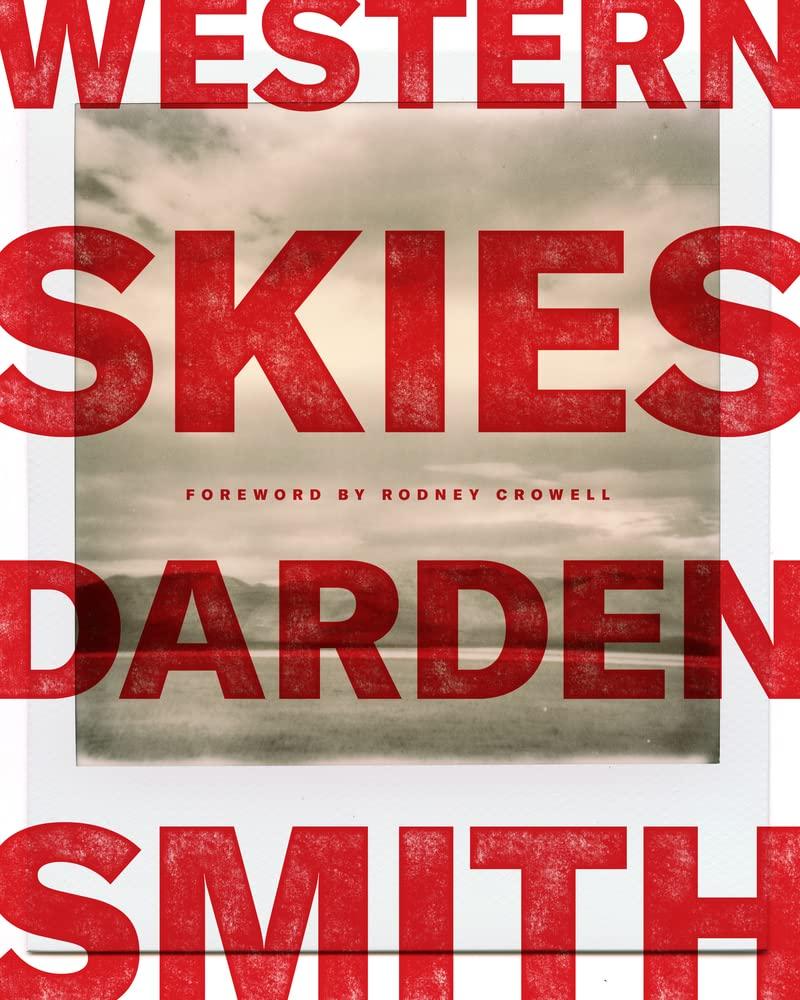
PHOTOGRAPHY / POETRY
Darden Smith
Dexterity
Hardcover, eBook, and audio book, ISBN: 9781947297425 (Hardcover), 128 pages.
11 March 2022
If you’re from Texas, or the West, or maybe miss either, love both, then come get you some: Darden Smith’s Western Skies is a remarkable, stunning, visceral slice of West Texas you simply must live and breathe and savor.
“Simply” is the key, from the dry, sun-faded physicality of the hardcover itself, to the bones of the poetics, the ghostly gorgeous photography, and the jangly-easy melodies. And you really should judge this book by its cover: it’s a faded red Allsup’s font on a shotgun-pocked Texas 82 sign Guthrie bound as you mind the speed trap leaving the Seymour DQ. This collection will take you home to the wide, flat Panhandle, safe, warm, and dry.
Western Skies is a holistic mashup of sight, sound, feel, and remembrance. Some might call this sensory conglomeration experimental, but it’s really not. Actually, this multimedia work comprises the genius of the nineteenth-century aesthetic that revolutionized art, literature, and the British Royal Academy. “To see clearly,” John Ruskin, the Grand Poobah of aestheticism, said at the time, “is Poetry, prophecy and religion, all in one.” To that Darden has added music, which would be the envy of the Rossetti brothers, founders of the Pre-Raphaelite aesthetic rebellion Ruskin endorsed. The Rossettis and their Outlaw Brotherhood made no distinction between poetry and song, and Smith’s fusion of the two is remarkably seamless.
The book is divided into “writings” first, then “songs” which again, echoes the foundational aesthetic precept that there’s no division between poetry, song, sight, and sound. That’s much easier said than done, but Smith does it, and makes it look easy—which it certainly is not. The photos, spontaneous, burnished, costly and so practicality-constrained, add yet another artful sensation that layers a soulful depth in the Latin classicist term “Ut pictura poesis,” or poetry like pictures.
Consider the track “Not Tomorrow Yet,” which you can listen to—and watch—here. In fact, if you’re not facile with poetry, I’d recommend watching the video and hearing the song before reading the verse itself. The music conveys the melodious lyrics that transcend bare text—the polysyndeton structures of repetition become waves lapping a shore in Smith’s easy, neo-Jackson Browne voicing. Lyrics whisper a dusty wind; meter clacks like a locomotive on railroad steel or highway slabs thumping below pickup tires. You live the prose like a dream barely remembered, but real just the same.
“Not Tomorrow Yet” has more drive and definition than the average cut in this collection, but they are all wonderfully plangent, with sun glints of acoustic guitar sevenths and add-nines (I think; I could be wrong), and melodious keyboard walk downs that carry the lyrical sensation gently, inexorably. The overall effect is that Western Skies washes over you with a soft warmth, with an echo of loneliness, partly reconciled, haunting still.
Smith is strongest in the free verse, both in the emotionally freighted section intros, and compositions such as “Sierra Blanca,” which trickles and flows like the slope of the tired land to the Rio Grande. There’s a lingering melancholy that is the substrata of Western Skies, a sighing hope against enveloping darkness, “smoke and people come north and east,” noted in faceless passing as Smith and “a blue haze drifts south, to the unseen border.” For the reader, like Smith’s traveler, “there is no resolution here,” only exhilaration in the encroaching darkness, a search for self against the dusty, fading nothingness.
Western Skies is a rich, cyclonic kaleidoscope: the poetry is splendidly pictorial; the photos archly poetic. And that mesmerizing effect doesn’t even include the lush musical color that overlays the pictures and poetry.
I wrote a four-hundred-page doctoral dissertation on Pre-Raphaelite aesthetic criticism, and I can honestly say that neither they nor I ever saw a more perfect, holistic artistic expression than Darden Smith’s Western Skies. It is, in Ruskin’s vision, “poetry, prophecy and religion, all in one.”
Darden Smith is a singer-songwriter based in Austin whose 30-year career redefines what it means to be a musician. In addition to 15 critically acclaimed albums, Smith continues to break new ground using the craft of songwriting in education, entrepreneurship, and in service to others. He is the founder and creative director of SongwritingWith:Soldiers, a nonprofit that pairs award-winning songwriters with veterans and service members in retreat settings to craft songs about combat and the return home. Darden lives with his wife in Austin, TX. Western Skies is his second book.
